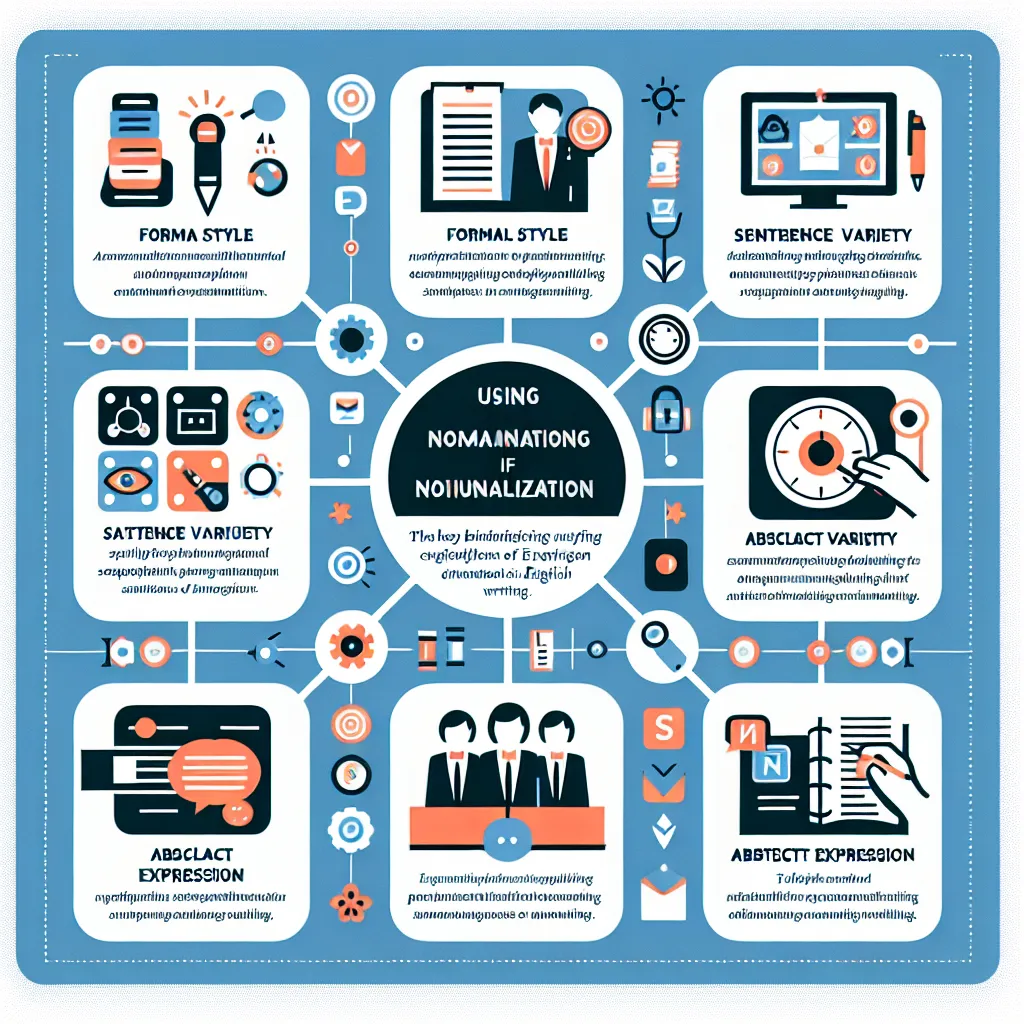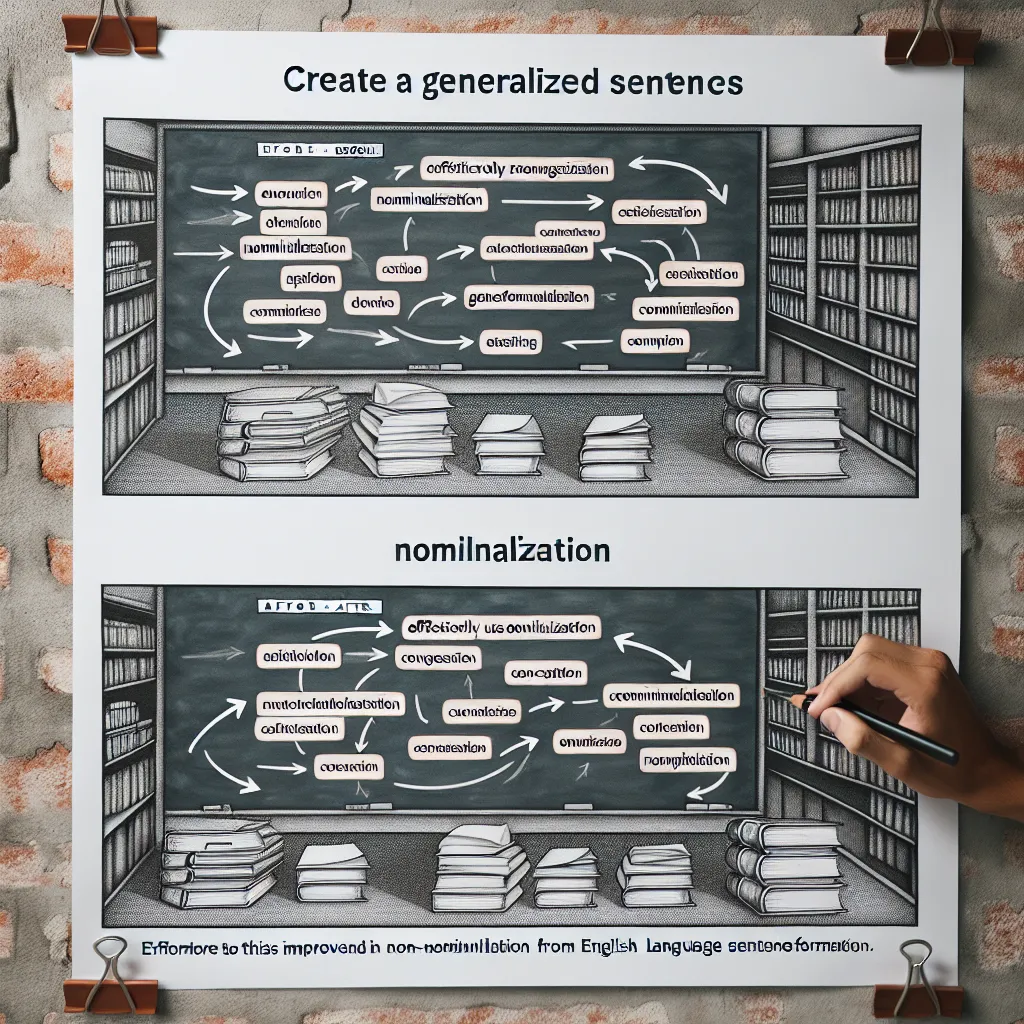Mastering the art of nominalization is a crucial skill for advanced English learners, particularly those preparing for academic writing or professional communication. This guide will explore the intricacies of nominalization, providing you with practical tips and examples to enhance your writing style and elevate your language proficiency.
Understanding Nominalization
Nominalization is the process of turning verbs or adjectives into nouns. This grammatical technique allows writers to express complex ideas more concisely and formally, making it particularly valuable in academic and professional contexts.
Why is Nominalization Important?
- Enhances formal writing style
- Increases sentence variety
- Allows for more abstract and nuanced expression
- Improves cohesion in academic and professional texts
 Importance of Nominalization
Importance of Nominalization
How to Form Nominalizations
From Verbs to Nouns
Many verbs can be transformed into nouns by adding suffixes. Common patterns include:
-
Adding “-tion” or “-sion”:
- Educate → Education
- Decide → Decision
-
Adding “-ment”:
- Develop → Development
- Achieve → Achievement
-
Adding “-ance” or “-ence”:
- Perform → Performance
- Exist → Existence
From Adjectives to Nouns
Adjectives can also be nominalized, often by adding suffixes:
-
Adding “-ity”:
- Flexible → Flexibility
- Stable → Stability
-
Adding “-ness”:
- Happy → Happiness
- Kind → Kindness
Applying Nominalization in Sentences
Let’s examine how nominalization can transform sentences:
-
Original: The company decided to expand globally.
Nominalized: The company’s decision to expand globally… -
Original: Scientists discovered a new species.
Nominalized: The discovery of a new species… -
Original: The team successfully implemented the project.
Nominalized: The successful implementation of the project…
Notice how the nominalized versions sound more formal and allow for more complex sentence structures.
Benefits of Using Nominalization
Conciseness
Nominalization often leads to more concise expression:
- Original: The manager explained how the new system worked.
- Nominalized: The manager’s explanation of the new system’s functionality…
Emphasis on Concepts
Nominalization shifts focus from actions to concepts:
- Original: We analyzed the data thoroughly.
- Nominalized: Our thorough analysis of the data…
Improved Text Cohesion
Nominalized forms can serve as effective subject nouns, improving text flow:
- Original: The researchers conducted experiments. The experiments showed interesting results.
- Nominalized: The researchers’ experiments showed interesting results.
 Benefits of Nominalization
Benefits of Nominalization
Common Pitfalls and How to Avoid Them
Overuse
While nominalization is valuable, overusing it can lead to overly dense and hard-to-read text. Balance is key.
Tip: Use a mix of nominalized and non-nominalized forms for variety and clarity.
Loss of Agency
Nominalization can sometimes obscure who is performing an action.
Example:
- Less clear: The implementation of the policy…
- More clear: The government’s implementation of the policy…
Tip: When necessary, include the agent to maintain clarity.
Wordiness
In some cases, nominalization can make sentences longer.
Example:
- Wordy: The making of a decision about the project’s future…
- Concise: Deciding the project’s future…
Tip: Use nominalization judiciously, opting for simpler forms when they communicate more effectively.
Practical Exercises to Perfect Nominalization
- Identify and underline nominalizations in academic texts or professional reports.
- Rewrite a paragraph from a news article using nominalizations where appropriate.
- Create a list of common verbs and adjectives you use, then practice forming their nominalized versions.
- Write two versions of a short essay – one with and one without nominalizations. Compare the effect on style and formality.
Advanced Techniques
Combining Nominalization with Other Structures
Nominalization can be particularly powerful when combined with other advanced structures:
- With passive voice: “The implementation of the new system was overseen by the IT department.”
- In complex noun phrases: “The rapid development and successful deployment of the new technology…”
Using Nominalization for Thematic Progression
Nominalization can help in creating smooth transitions between sentences and paragraphs:
“The company faced significant challenges. These challenges led to a comprehensive restructuring. The restructuring process involved…”
Conclusion
Perfecting The Use Of Nominalization is a valuable skill for advancing your English proficiency, particularly in academic and professional contexts. By understanding its formation, benefits, and potential pitfalls, you can effectively incorporate this technique into your writing. Remember to practice regularly and always consider your audience and purpose when deciding how and when to use nominalization.
We encourage you to experiment with the exercises provided and to analyze high-quality texts for examples of effective nominalization. As you continue to refine this skill, you’ll find your writing becoming more sophisticated and your ability to express complex ideas improving significantly.




